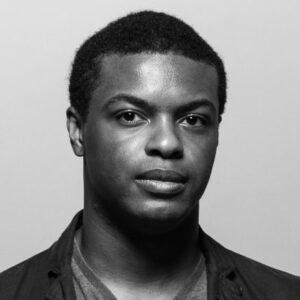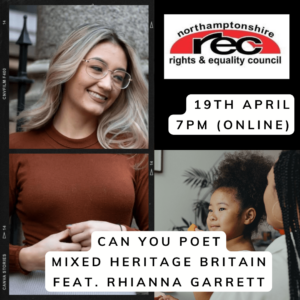Mixed Heritage Britain – Mixed heritage experiences in UK higher education


My name is Rhianna, and I am a PhD researcher and race equity activist here at Loughborough. I am part of a doctoral training centre called ‘Unequal Academic Citizenship: Opportunities and Barriers to Participation and Inclusion of Cultural Diversity and Intersecting Identities in Higher Education’(CITHEI) where I and five other PhDs focus on tackling unequal academic citizenship in higher education.
My project investigates the underrepresentation of racialised minority staff in UK higher education, with a focus on the early stages of academic careers through PhDs and early career researchers. I have also been enacting student-led activism for the past few years at a number of institutions, both professionally and independently.

My colleague and friend Tré Ventour-Griffiths is a creative writer and public historian-sociologist whose work can be broadly contained within Black British histories, race/neurodivergence and intersectionality. An interdisciplinary thinker, he is also a PhD Student at Kingston University whose research interests look at Black Histories in provincial England. Meanwhile, his wider work in the arts, social sciences and humanities has also allowed him to work with others, including anti-racist and neurodiversity-affirming advocacy groups and organisations.
Why is the topic important to me?
As a Chinese mixed-heritage woman in higher education, I have found it difficult to navigate these spaces. My first anti-racism project Active Together, which aimed to address racism in sports clubs and societies, was created due to my mixed identity being criticised, scrutinised, and denied. However, my leadership in activism gave me the skills, creativity, and confidence to pursue a PhD in an area I care deeply about and opened up a number of opportunities.
Not only does this project come from a personal place, but it is also in desperate need of more research. Out of over 22,000 professors in UK higher education, there are only 41 Black women in these positions. In a wider picture, the Higher Education Statistics Agency (HESA) in 2017/2018 found that 85% of postgraduate researchers identified as white, 4% Black, 8% Asian, 3% mixed, and 2% other. Both research and statistics show that there are significant barriers facing racialised minority academics when entering and maintaining these career trajectories.
Experiences being mixed heritage in UK higher education
As a fast-growing population in both the UK and in higher education as a whole, there are limited discussions about mixed heritage experiences in these spaces and how they represent how race is understood as a social construction.
I like to tell stories about how my racial identity as a half-Chinese, half-white woman has been understood and changed depending on where I am. In one space, I can be heavily racialised, and in another space, my identity can be questioned.
Not Chinese enough
I used to play polo, and at a social event a woman told me I was ‘not really Chinese’, and this has been questioned by many people in many spaces due to my whiteness. My Chinese mother was also born in Indonesia, grew up in Nigeria, and spent the rest of her life in Nigeria, whilst the rest of my family now live in Singapore, and very few of us speak fluent Chinese because of this. This leads to a lot of people invalidating my identity.
Too ethnic
In other spaces, I am either too ethnic, or just ethnic enough. In that same polo club, I was used as a representation of the diversity of their club, showing I was “as ethnic as they were willing to go”, asked if I “eat bat soup”, or described as ‘exotic’.
To me, these present examples of how race is heavily misunderstood in higher education spaces and needs to be addressed at a deeper level of lived experience.
Inclusion and belonging
Loughborough University’s Race Equality Charter states that it aims to increase a sense of inclusion and belonging to the higher education space, but we also need to question what system we are ‘belonging’ to or being ‘included’ within. If we are including everyone in a violent system, we are ignoring the fundamentally flawed system itself, which creates an environment that makes real justice difficult to flow within. Inclusion and belonging do not ensure long-term, sustainable justice, and do not always address mixed heritage experiences.
But there is also power in my mixed identity, and that is how I wish to see it. Just my existence in a space can create change, my identity and stories can amplify others like my own, it gives me community and a sense of belonging, and brings me closer to my vibrant heritage.
Find out more about mixed heritage experiences in Britain
The arrival of figures such as Meghan Markle has shown us all too well that the British establishment has a selective memory when it comes to the place of Mixed Heritage people in Britain. The place of Mixed Heritage people in today’s Britain is not new, but simply the latest chapter of a history that dates back to at least the days of the Tudors when Africans in Early Modern England lived, worked and had (intimate and domestic) relationships with white people.
Some examples of literature discussing these histories:
- With Britain’s history of cultural and racial mixing, organisations like the Mixed Museum exist to document and disseminate it to the public.
- Recent published work of authors and academics – including Afua Hirsch, Remi Adekoya and Natalie Morris – is predated by books like Mixed-Race Britain in the Twentieth Century and Mixed Race Amnesia: Resisting the Romanticization of Multiraciality.
- The Black Georgians in the eighteenth century, the Black Victorians in the nineteenth century, and the Black Edwardians in the early years of the twentieth century – many of them married outside of their race.
- Many of the soldiers that came back from WWI also built families with white women. The same happened again when thousands of Black American GIs were stationed in Britain during the latter years of the Second World War, some left Mixed-Race children behind – a product of their relationships with white British women.
- Lucy Bland’s Britain’s Brown Babies discusses this further.

This is a small description that has focused on Mixed Black histories, but Mixed Heritage has plurality and needs to be better addressed and understood.
To hear more on mixed heritage experiences in Britain, please attend Tre’s event entitled ‘Can You Poet: Mixed Heritage Britain’, a free online event where I will be further discussing my experiences, and you will also hear from a number of poets and storytellers.
Equity, Diversity and Inclusion
Reflections, comments, discussion and opinion on EDI topics from Loughborough University staff and students